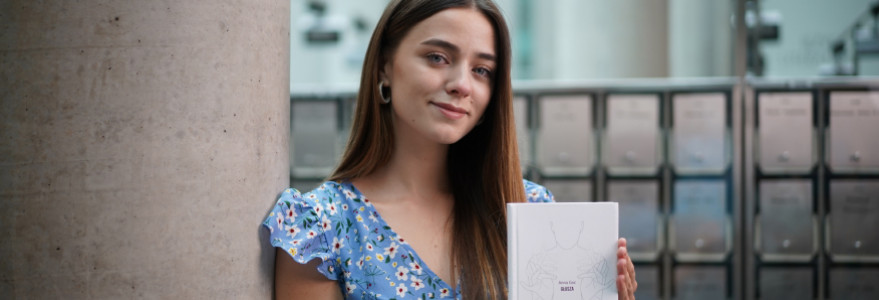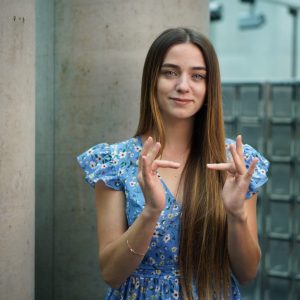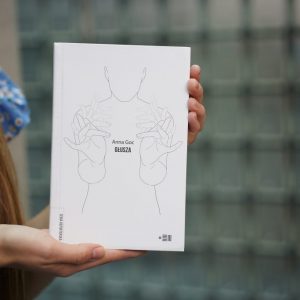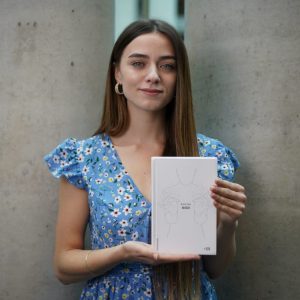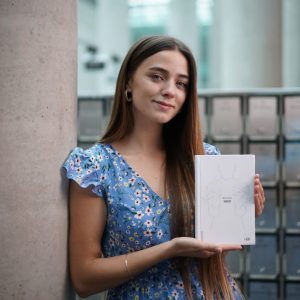“This book opens the door to the world, which most of us don’t know. It is an obligatory reading for all those, who want to understand the world of silence, the world of the Deaf,” this is how Adrianna Glegoła, a doctoral candidate at the UW’s Doctoral School of Humanities and a Polish Sign Language Philology student, described the book “Deaf” by Anna Goc in the episode of the “Read with the UW”.
Adrianna Glegoła graduated from the Jagiellonian University in Kraków. She specialises in the English and Russian languages. Glegoła completed postgraduate studies in audio-visual translations. She gained international experience during student exchange in Russia, Italy and the USA. She is a two-time laureate of the international translation competition.
In 2023, Adrianna Glegoła started her doctoral studies at the Doctoral School of Humanities of the University of Warsaw. At the same time, she continues her education studying Polish Sign Language Philology at the UW – the only programme of this kind offered in Poland.
D like Deaf
“Deaf is a story of a community ignored by the system. Because of deafness and unfamiliarity with the Polish language, its members were deprived of the right to decide about themselves,” says Adrianna Glegoła, a doctoral candidate from the Doctoral School of Humanities and Polish Sign Language Philology student.
In her book, Anna Goc, a journalist of “Tygodnik Powszechny” and laureate of the Ryszard Kapuściński Award, gave voice to the Deaf people.
The book opens the door to the world of the Deaf. One can learn from it that the Deaf are disabled only among people who can hear. Between each other, the Deaf can use their own language and do not see themselves as others. Deaf people use to say that “deafness is not a disease or a disability, and ask to address their community with capital D – Deaf”.
Language of Deaf
“The Deaf do not need to know how to write or read in Polish – it is a foreign language for them. Their first natural language is PJM, Polish Sign Language,” Adrianna Glegoła emphasises.
“There are, in fact, Deaf people in Poland, who do not know Polish. They can’t speak or read in Polish, although they graduated from the schools for the Deaf,” one learns from the book.
“From Anna Goc’s book, we find out that there is no universal sign language and not every Deaf person can learn Polish. For many, it is simply impossible,” Adrianna Glegoła explains and underlines the important role of sign language interpreters.
True stories described in the book, like a Deaf married couple who cannot call an ambulance to a sick child or a Deaf pregnant woman whose little son (nobody else knows sign language) needs to tell her that a newborn baby could not be saved, are truly moving and devastating.
It is a reporter’s account of specific stories backed up by a substantial knowledge of the Deaf world and language.
“Deaf is a very important and needed book, which features the reality of the Deaf community. It tells the stories of Deaf children of hearing parents, hearing children of Deaf parents (CODA), education of the Deaf, the difference between Polish Sign Language and a sign language system, but foremost of the lack of understanding and exclusion,” Adrianna Glegoła says and adds: “This is not an easy reading, but I definitely recommend to reach for it”.
The book Deaf by Anna Goc can be found at the University of Warsaw Library in free access in the “Social Science” section and at the library of the Faculty of Polish Studies.
Polish Sign Language is a visual-spatial language used in every day communication of the Deaf community in Poland. It is not a visual representation of the phonic Polish language, because it varies from it when it comes to vocabulary and grammar. It was developed around 200 years ago, when the first school for Deaf people was opened in Warsaw.
Besides the University of Warsaw, there is no organised teaching of Polish Sign Language on the academic level in Poland. The Polish Sign Language Philology is a study programme opened at the UW’s Faculty of Polish Studies in October 2019. There is also a possibility to take a Polish Sign Language course, just like those in phonic languages.



